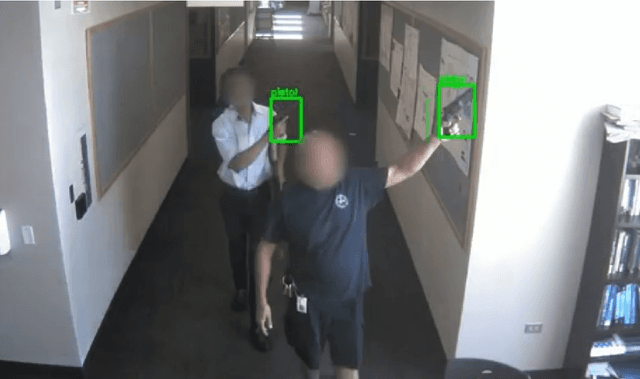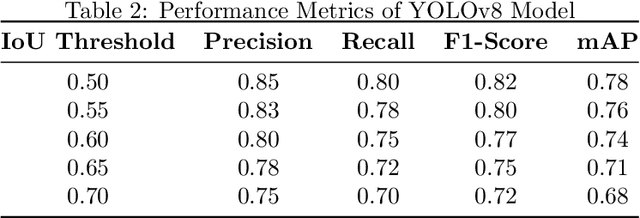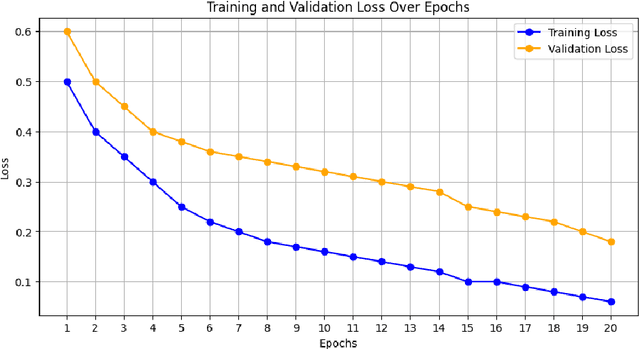Ayush Thakur
Real-Time Weapon Detection Using YOLOv8 for Enhanced Safety
Oct 23, 2024



Abstract:This research paper presents the development of an AI model utilizing YOLOv8 for real-time weapon detection, aimed at enhancing safety in public spaces such as schools, airports, and public transportation systems. As incidents of violence continue to rise globally, there is an urgent need for effective surveillance technologies that can quickly identify potential threats. Our approach focuses on leveraging advanced deep learning techniques to create a highly accurate and efficient system capable of detecting weapons in real-time video streams. The model was trained on a comprehensive dataset containing thousands of images depicting various types of firearms and edged weapons, ensuring a robust learning process. We evaluated the model's performance using key metrics such as precision, recall, F1-score, and mean Average Precision (mAP) across multiple Intersection over Union (IoU) thresholds, revealing a significant capability to differentiate between weapon and non-weapon classes with minimal error. Furthermore, we assessed the system's operational efficiency, demonstrating that it can process frames at high speeds suitable for real-time applications. The findings indicate that our YOLOv8-based weapon detection model not only contributes to the existing body of knowledge in computer vision but also addresses critical societal needs for improved safety measures in vulnerable environments. By harnessing the power of artificial intelligence, this research lays the groundwork for developing practical solutions that can be deployed in security settings, ultimately enhancing the protective capabilities of law enforcement and public safety agencies.
Security Implications and Mitigation Strategies in MPLS Networks
Sep 04, 2024


Abstract:Multiprotocol Label Switching (MPLS) is a high-performance telecommunications technology that directs data from one network node to another based on short path labels rather than long network addresses. Its efficiency and scalability have made it a popular choice for large-scale and enterprise networks. However, as MPLS networks grow and evolve, they encounter various security challenges. This paper explores the security implications associated with MPLS networks, including risks such as label spoofing, traffic interception, and denial of service attacks. Additionally, it evaluates advanced mitigation strategies to address these vulnerabilities, leveraging mathematical models and security protocols to enhance MPLS network resilience. By integrating theoretical analysis with practical solutions, this paper aims to provide a comprehensive understanding of MPLS security and propose effective methods for safeguarding network infrastructure.
Introducing Super RAGs in Mistral 8x7B-v1
Apr 13, 2024Abstract:The relentless pursuit of enhancing Large Language Models (LLMs) has led to the advent of Super Retrieval-Augmented Generation (Super RAGs), a novel approach designed to elevate the performance of LLMs by integrating external knowledge sources with minimal structural modifications. This paper presents the integration of Super RAGs into the Mistral 8x7B v1, a state-of-the-art LLM, and examines the resultant improvements in accuracy, speed, and user satisfaction. Our methodology uses a fine-tuned instruct model setup and a cache tuning fork system, ensuring efficient and relevant data retrieval. The evaluation, conducted over several epochs, demonstrates significant enhancements across all metrics. The findings suggest that Super RAGs can effectively augment LLMs, paving the way for more sophisticated and reliable AI systems. This research contributes to the field by providing empirical evidence of the benefits of Super RAGs and offering insights into their potential applications.
A Unified Module for Accelerating STABLE-DIFFUSION: LCM-LORA
Mar 24, 2024



Abstract:This paper presents a comprehensive study on the unified module for accelerating stable-diffusion processes, specifically focusing on the lcm-lora module. Stable-diffusion processes play a crucial role in various scientific and engineering domains, and their acceleration is of paramount importance for efficient computational performance. The standard iterative procedures for solving fixed-source discrete ordinates problems often exhibit slow convergence, particularly in optically thick scenarios. To address this challenge, unconditionally stable diffusion-acceleration methods have been developed, aiming to enhance the computational efficiency of transport equations and discrete ordinates problems. This study delves into the theoretical foundations and numerical results of unconditionally stable diffusion synthetic acceleration methods, providing insights into their stability and performance for model discrete ordinates problems. Furthermore, the paper explores recent advancements in diffusion model acceleration, including on device acceleration of large diffusion models via gpu aware optimizations, highlighting the potential for significantly improved inference latency. The results and analyses in this study provide important insights into stable diffusion processes and have important ramifications for the creation and application of acceleration methods specifically, the lcm-lora module in a variety of computing environments.
Loops On Retrieval Augmented Generation (LoRAG)
Mar 18, 2024



Abstract:This paper presents Loops On Retrieval Augmented Generation (LoRAG), a new framework designed to enhance the quality of retrieval-augmented text generation through the incorporation of an iterative loop mechanism. The architecture integrates a generative model, a retrieval mechanism, and a dynamic loop module, allowing for iterative refinement of the generated text through interactions with relevant information retrieved from the input context. Experimental evaluations on benchmark datasets demonstrate that LoRAG surpasses existing state-of-the-art models in terms of BLEU score, ROUGE score, and perplexity, showcasing its effectiveness in achieving both coherence and relevance in generated text. The qualitative assessment further illustrates LoRAG's capability to produce contextually rich and coherent outputs. This research contributes valuable insights into the potential of iterative loops in mitigating challenges in text generation, positioning LoRAG as a promising advancement in the field.
 Add to Chrome
Add to Chrome Add to Firefox
Add to Firefox Add to Edge
Add to Edge